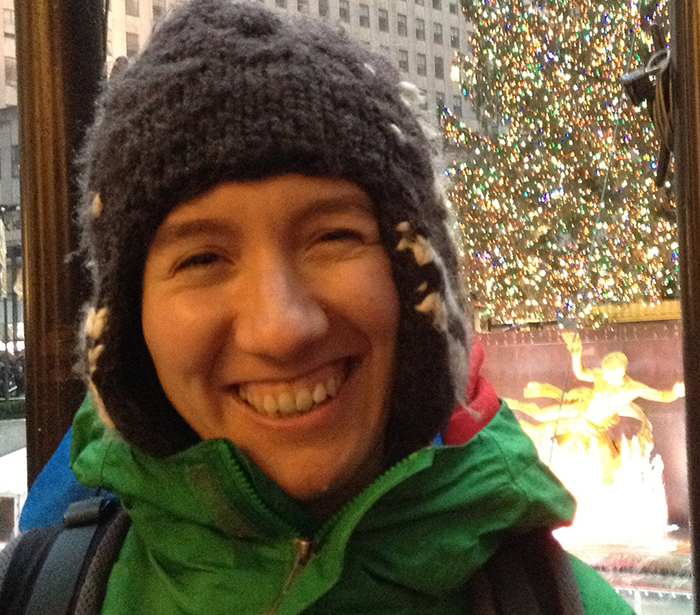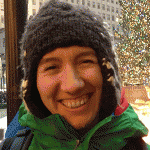We’re taking time over the following weeks to get to know the members of the GSA’s Early Career Scientist Committees. Join us every week to learn more about our early career scientist advocates.
Giovanna Collu
Co-chair, Policy Subcommittee
Icahn School of Medicine at Mount Sinai
Research Interest
For functional tissues to form, individual cells must orient themselves correctly and behave appropriately for their specific location in the body. To accomplish this, a group of proteins works together in localized complexes to establish directionality within a cell and align it with its neighbors. I study how this process, known as planar cell polarity, or PCP, works during the development of the fruit fly. I’m focused on how these protein complexes transmit spatial cues that act as signposts to mark direction across a tissue—similar to signs on a highway telling traffic to flow east or west to reach its destination. PCP signals can direct and coordinate cell differentiation, the behavior of groups of cells, or the orientation of individual cellular protrusions, depending on the tissue. By studying these proteins, such as those required to align fly bristles, we can understand how their human counterparts act, like those in the inner ear that allow cells to sense sound waves. In turn, this understanding can inform research on associated human diseases including hearing impairments, spina bifida, and skeletal growth syndromes.
As a PhD–trained scientist, you have many career options. What career paths interest you the most?
PhD training develops the analytical skills and subject knowledge needed to work across a broad spectrum of academic, industry and government careers—so many, in fact, that it can be difficult to navigate the scientific career landscape. I have been committed to public service and equitable and sustainable research since my undergraduate career, but it wasn’t until I was selected as an American Physiological Society (APS) Fellow that I realized a science policy career would be the perfect fit. Through the APS fellowship, I participated in mentored congressional visits and learned from scientists active in public policy. Since then, I have continued to engage in advocacy efforts and policy discussions. From the creation of policy governing how science is performed, such as the Next Generation Researchers Initiative at NIH, to using science to inform all aspects of public policy making, it is vital that science-literate professionals are involved in the process. I look forward to combining my scientific expertise with my experience in advocacy and policy to advance evidence-based decision-making for equitable public policy outcomes.
In addition to your research, how else do you want to advance the scientific enterprise?
Increased communication among early career members of the GSA is one of my goals. As a necessary first step, I have worked with the science policy committee and GSA staff to establish a weekly ECS newsletter as a way to communicate with members and to raise awareness of science policy issues and fellowship opportunities. It is crucial that GSA members are able to advocate for overall research funding as well as to articulate the importance of model organisms specifically. In the long term, championing model organisms and basic science—and increasing the number of non-scientists who understand their value—will lead to improved funding, robust and well-informed scientific debate, a healthy future for our discipline, and productive scientific research.
As a leader within the Genetics Society of America, what do you hope to accomplish?
As co-chair of the policy subcommittee, I will work to bring opportunities for developing science policy skills to GSA ECS members, both by highlighting formal programs and by supporting members to advocate on their own behalf. There are currently many barriers facing prospective policy fellows, including geographic location, visa status, and the time limits placed on applicant eligibility. Together with the policy subcommittee, I am creating a comprehensive database of the science policy fellowships available so that members can identify those that fit their requirements. I hope that ECS members will use our database to search based on their own criteria and find fellowships for which they are well suited. We will also be producing guides to crafting successful applications for a range of different types of opportunity. I hope that these will help early career scientists enhance their competitiveness for these programs. In addition, I will be writing online articles on science policy issues that particularly affect ECS members. In these posts, I aim to provide background information to contextualize prospective policy changes and to provide tools so that early career scientists can advocate for their interests.
Previous Leadership Experience
- Early career advocacy fellow—American Physiological Society
- Co-director of Advocacy, Postdoc Executive Committee—Icahn School of Medicine at Mount Sinai
- Mentor—The New York Academy of Sciences
- Founding member, Public Engagement Committee—Wellcome Trust Center for Cell-Matrix Research, University of Manchester
Contact
Twitter: @fruitflyfriend
































